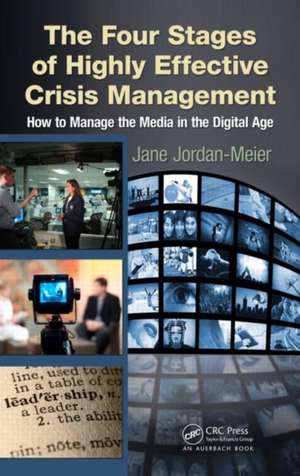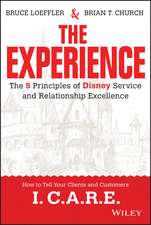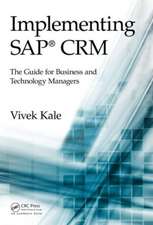The Four Stages of Highly Effective Crisis Management: How to Manage the Media in the Digital Age
Autor Jane Jordanen Limba Engleză Hardback – 14 mar 2011
Unveiling the secrets of how to manage the media in a crisis, the book examines how rapidly evolving social media and Web 2.0 technologies have changed the crisis management landscape. It illustrates the four distinct stages of media reporting during a crisis and details the information that must be provided. The author provides readers with a wealth of helpful tips and tools—including guidelines, checklists, and case studies that illustrate best practices in crisis media management. Divided into five sections, the book:
- Examines how the kingdom of news has changed and considers the new hybrid model that is emerging
- Identifies the four distinct stages in which both old and new media report a crisis
- Addresses the use of spokespeople according to the four stages, as well as when to use the chief executive officer
- Discusses media interviews, including how to handle news conferences, bloggers, and the importance of media training
- Considers the communication aspects of crisis management—including how to harness the power of Facebook, Twitter, YouTube, Digg, Wikipedia, Flickr, and social media releases
Jane Jordan-Meier was interviewed about leadership in a crisis and the stages of a crisis in the wake of the Murdoch phone-hacking scandal. She also discusses crisis management planning in The Sydney Morning Herald and in Daily Ovation. She was interviewed in August 2011 by Globe and Mail.Discover more about the book, including a video of the author explaining how to turn media questions into gold and visit smallbusinessadvocate.com for a series of recent interviews.
Jane Jordan-Meier appeared in a video interview with Crisis Manager Melissa Agnes on July 3, 2012.
Preț: 950.58 lei
Preț vechi: 1159.24 lei
-18% Nou
Puncte Express: 1426
Preț estimativ în valută:
181.92€ • 189.22$ • 150.18£
181.92€ • 189.22$ • 150.18£
Carte tipărită la comandă
Livrare economică 14-28 aprilie
Preluare comenzi: 021 569.72.76
Specificații
ISBN-13: 9781439853733
ISBN-10: 1439853738
Pagini: 320
Ilustrații: 22 black & white illustrations
Dimensiuni: 156 x 234 x 23 mm
Greutate: 0.59 kg
Ediția:New.
Editura: Taylor & Francis
Colecția CRC Press
Locul publicării:Oxford, United Kingdom
ISBN-10: 1439853738
Pagini: 320
Ilustrații: 22 black & white illustrations
Dimensiuni: 156 x 234 x 23 mm
Greutate: 0.59 kg
Ediția:New.
Editura: Taylor & Francis
Colecția CRC Press
Locul publicării:Oxford, United Kingdom
Public țintă
Professional Practice & DevelopmentCuprins
MEDIA, CRISIS, AND NEW REPORTING TOOLS. What Is a Crisis? The Role of Media in a Crisis. Social, Interactive, and Everywhere All the Time. Media Ethics? What Drives Traditional Media Behavior. Twitter: Is It a Fad or the "8 Bazillion Pound Gorilla"? STAGES OF A CRISIS. SPOKESPEOPLE—SPEED MATTERS AND PERCEPTION IS EVERYTHING. Who? To Chief Executive Officer or Not? Head and Heart. Role of the Frontline. Policy Guidelines for Social Media. MEDIA INTERVIEWS—RULES OF ENGAGEMENT IN A CRISIS. Understanding Journalists’ Questions. Techniques to Get Your Message Across. Dealing with Difficult Questions. Never Repeat the Poison; Avoid Negative Language. How the New Media Are Changing the Rules for Interviews. Lights, Camera, Action—The Interview. Media Training. COMMUNICATION—RULES AND TOOLS. Why Communicate in a Crisis? What to Communicate? To Apologize or Not. Language in a Crisis—Fall in Love with We. No Toxic Language Please. How to Get Your Message Across. Where? New Media Tools. Monitoring. Appendices: Guidelines for Briefing Spokespeople. Sample Media Contact Information Log. Sample News Release. Useful Resources. Social Media Policy Resources. Social Media Resources for Crisis Communicators. Things You Should Not Share on Social Media. Wordpress Statement. Social Media Embracing the Opportunities, Averting the Risks.
Notă biografică
A former journalist, Jane Jordan-Meier has been at the forefront of media training for 15 years, developing unique and powerful methodologies in crisis media management. From her base in the United States, she works with corporations, government departments, and non-profit agencies in North America, Australia, and New Zealand. She is recognized as one of the world’s top media and crisis management experts.
Throughout her career, Jane has worked at the highest level of strategic planning and communication, including the Australian bi-centennial celebrations and the Sydney Olympic Games. Her clients range from experienced CEOs of global corporations to those doing their first media interviews. She works with organizations in crisis as well as those wanting to raise their profile with positive media interviews. Many of her programs and training have won awards from her peers in the public relations and communication professions.
In the 1990s, recognizing the need for executives to be highly skilled in handling the media, Jane co-established Media Skills, a media training consultancy. With former journalist Susan Templeman, she created a suite of methods for developing and delivering strategic media messages. This led to the development of a unique approach to managing crisis communication. The methodology has been licensed and used by a network of trainers around the globe.
Jane is a frequent guest speaker on crisis communication and media management at conferences in Australia, New Zealand, and North America. A licensed and accredited media trainer and coach, she holds a master’s degree in communication management. She has also taught communication, at both undergraduate and post-graduate levels in Australia’s top communication schools, as well as several professional development courses in Australia, New Zealand, and North America.
Throughout her career, Jane has worked at the highest level of strategic planning and communication, including the Australian bi-centennial celebrations and the Sydney Olympic Games. Her clients range from experienced CEOs of global corporations to those doing their first media interviews. She works with organizations in crisis as well as those wanting to raise their profile with positive media interviews. Many of her programs and training have won awards from her peers in the public relations and communication professions.
In the 1990s, recognizing the need for executives to be highly skilled in handling the media, Jane co-established Media Skills, a media training consultancy. With former journalist Susan Templeman, she created a suite of methods for developing and delivering strategic media messages. This led to the development of a unique approach to managing crisis communication. The methodology has been licensed and used by a network of trainers around the globe.
Jane is a frequent guest speaker on crisis communication and media management at conferences in Australia, New Zealand, and North America. A licensed and accredited media trainer and coach, she holds a master’s degree in communication management. She has also taught communication, at both undergraduate and post-graduate levels in Australia’s top communication schools, as well as several professional development courses in Australia, New Zealand, and North America.
Recenzii
"Jane Jordan-Meier’s insights into crisis communication are based on her experiences over many years at the coalface, guiding CEOs and organizations through the toughest of times. Her book is a must-read for any communication professional seeking an understanding of the power of social media and how the media report a crisis."
—Robyn Sefiani, Managing Director, Sefiani Communications Group, Australia
"… in the highly interactive and networked world we live in, all communication professionals need to understand how to effectively work with the media during and after crises. This book is an essential resource for doing so. Written by a highly experienced media relations consultant and savvy social media expert, this book provides practical, accessible advice and easy-to-use and apply tools and guides—all brought to life through real-world case studies."
—Michaela Hayes, Past President, San Francisco Chapter, International Association of Business Communicators
"As a full-time media and crisis trainer, I read about a dozen new books on public relations each year. Few produce the number of true "a ha" moments that Jane Jordan-Meier’s The Four Stages of Highly Effective Crisis Management did. ... the book is packed with hidden gems that even the most seasoned public relations professionals can learn from. ... it’s well worth the investment. I highly recommend it."
—Brad Phillips, Author, Mr. Media Training Blog
"The Four Stages of Highly Effective Crisis Management: How to Manage the Media in the Digital Age is a full-blown training course in a book. Author Jane Jordan-Meier has used her vast experience in the media, PR and media-management to craft a resource that will be invaluable to all who face, or may have to face, a crisis. … I've no doubt that every good communication professional will read and gain from this book. So should every good CEO. For as Jordan-Meier points out, the "credibility factor for CEOs (2010 Edelman Trust Barometer) was 40%" only slightly above politicians at 35%, so surely a ready-made market. Highly recommended."
—Bob Selden, What To Do When You Become The Boss: How New Managers Become Successful Managers
"This book ticks all the boxes - it's well grounded in crisis communication theory, it's written with a clear understanding of adult learning, and it's incredibly practical and actionable, making it an easy book to get a lot of actionable stuff out of to help you be better prepared for your next crisis - before it comes. … I was impressed!"
—Public Affairs Manager, Pharmaceutical Industry
"This book is a must read for owners, officers, managers and key employees of any public or private business. Emergencies happen. Unplanned consequences of natural or man-made disasters can bring a business to its knees. I have been there. This book provides an outstanding, comprehensive plan that will keep you and your business focused on what is important during any emergency."
—Gloria E. Collins, Business Executive, California
"I use this excellent book in my course called 'Media in the Business World,' a course designed for graduate students who pursue careers as business leaders. In the course, the students study the rules of the media game as seen from three perspectives: the media professionals, the business world and the academia.
"With regards to the perspective of the business world, The Four Stages of Highly Effective Crisis Management is the most up-dated and substantiated book on the market. Some reasons:
—Kirsten Mogensen, Associate Professor, Roskilde University
"I would highly recommend reading the book and passing it on. It may well start the most important conversation your organization will have in 2012."
—Chris Syme, Strategic Communications Expert, Principal of CKSyme.org in Bozeman, Montana
"The book addresses all aspects of planning for and managing the media in a crisis situation … [and] provides proven methods and tips for managing the information flow, including harnessing the power of Facebook, Twitter, YouTube, Wikipedia, and other social media releases. Jordan-Meier brings to bear her unique experience in media training and crisis communication principles. A worthwhile resource for anyone responsible for dealing with the media in a crisis situation. 4 stars."
—ASIS International
"One of the best and the most thorough books on crisis management in the digital age that I have ever read … a must-read."
—Crisis Manager Melissa Agnes
"Jordan-Meier brings to bear her unique experience in media training and crisis communication principles. The case studies help to illuminate the issues. This book reflects best thinking and current practices in crisis media management. It would be a worthwhile resource for anyone responsible for dealing with the media in a crisis situation."
—David P. Sayer, in Security Management
—Robyn Sefiani, Managing Director, Sefiani Communications Group, Australia
"… in the highly interactive and networked world we live in, all communication professionals need to understand how to effectively work with the media during and after crises. This book is an essential resource for doing so. Written by a highly experienced media relations consultant and savvy social media expert, this book provides practical, accessible advice and easy-to-use and apply tools and guides—all brought to life through real-world case studies."
—Michaela Hayes, Past President, San Francisco Chapter, International Association of Business Communicators
"As a full-time media and crisis trainer, I read about a dozen new books on public relations each year. Few produce the number of true "a ha" moments that Jane Jordan-Meier’s The Four Stages of Highly Effective Crisis Management did. ... the book is packed with hidden gems that even the most seasoned public relations professionals can learn from. ... it’s well worth the investment. I highly recommend it."
—Brad Phillips, Author, Mr. Media Training Blog
"The Four Stages of Highly Effective Crisis Management: How to Manage the Media in the Digital Age is a full-blown training course in a book. Author Jane Jordan-Meier has used her vast experience in the media, PR and media-management to craft a resource that will be invaluable to all who face, or may have to face, a crisis. … I've no doubt that every good communication professional will read and gain from this book. So should every good CEO. For as Jordan-Meier points out, the "credibility factor for CEOs (2010 Edelman Trust Barometer) was 40%" only slightly above politicians at 35%, so surely a ready-made market. Highly recommended."
—Bob Selden, What To Do When You Become The Boss: How New Managers Become Successful Managers
"This book ticks all the boxes - it's well grounded in crisis communication theory, it's written with a clear understanding of adult learning, and it's incredibly practical and actionable, making it an easy book to get a lot of actionable stuff out of to help you be better prepared for your next crisis - before it comes. … I was impressed!"
—Public Affairs Manager, Pharmaceutical Industry
"This book is a must read for owners, officers, managers and key employees of any public or private business. Emergencies happen. Unplanned consequences of natural or man-made disasters can bring a business to its knees. I have been there. This book provides an outstanding, comprehensive plan that will keep you and your business focused on what is important during any emergency."
—Gloria E. Collins, Business Executive, California
"I use this excellent book in my course called 'Media in the Business World,' a course designed for graduate students who pursue careers as business leaders. In the course, the students study the rules of the media game as seen from three perspectives: the media professionals, the business world and the academia.
"With regards to the perspective of the business world, The Four Stages of Highly Effective Crisis Management is the most up-dated and substantiated book on the market. Some reasons:
- The author understands how the social media work and how important they are for information sharing. She keeps reminding the readers that the old rules of the game from the time of the "old media" are still valuable, but that companies need to consider social media just as important. She also describes the difference – the old media might set the agenda and are driven by concern for democracy, while the new media are fast and autonomous.
- The author has a background from professional journalism as well as a background from media training with companies. One of the values of the book is that it is based on an understanding of professional journalism. Here are no superficial suggestions on how to "spin", but quite the contrary with an emphasis on key concepts like trustworthy, transparent, timely, accessible, responsible, humility, respect, experience, passion; and lots of tools for business leaders who will not only survive but strive to become master players in the game. As an example the author writes about the investigative reporters asking critical questions: "questions are gifts, but not all are attractive. And they need to be grasped with both hands – in this case, with one’s mouth!" The message is that since you cannot change the rules of the game; play them to your advantage.
- The book contains many case studies, and these are of major crisis in the last 10 years – again updated information about the lessons that other companies learned the hard way.
—Kirsten Mogensen, Associate Professor, Roskilde University
"I would highly recommend reading the book and passing it on. It may well start the most important conversation your organization will have in 2012."
—Chris Syme, Strategic Communications Expert, Principal of CKSyme.org in Bozeman, Montana
"The book addresses all aspects of planning for and managing the media in a crisis situation … [and] provides proven methods and tips for managing the information flow, including harnessing the power of Facebook, Twitter, YouTube, Wikipedia, and other social media releases. Jordan-Meier brings to bear her unique experience in media training and crisis communication principles. A worthwhile resource for anyone responsible for dealing with the media in a crisis situation. 4 stars."
—ASIS International
"One of the best and the most thorough books on crisis management in the digital age that I have ever read … a must-read."
—Crisis Manager Melissa Agnes
"Jordan-Meier brings to bear her unique experience in media training and crisis communication principles. The case studies help to illuminate the issues. This book reflects best thinking and current practices in crisis media management. It would be a worthwhile resource for anyone responsible for dealing with the media in a crisis situation."
—David P. Sayer, in Security Management
Descriere
Presenting cutting-edge media communication solutions, this book explains methods for choosing the appropriate language and media outlet to properly convey a message during and after a crisis. Unveiling the secrets of how to manage the media in a crisis, it examines how rapidly evolving social media and Web 2.0 technologies have changed the crisis management landscape. Illustrating the four distinct stages of media reporting during a crisis, the text includes a wealth of helpful tools, including guidelines, checklists, and case studies that illustrate best practices.


















